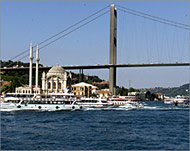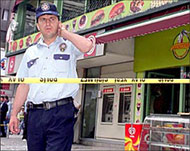Turkey tries to shut Europe’s high road
With a weekend haul of 47kg of heroin and five arrests, it was business as usual for Turkey’s drugs squad in the Aegean province of Aydin.

While it is something of a cliche that the country is a bridge between East and West, when it comes to illicit drugs, Turkey has long been a major venue for this two-way traffic.
The country is both a front line state in the battle to combat the trade in opium from southwest Asia – and in the battle to combat the trade in chemicals used in the production of synthetic drugs that come from Europe.
From a point of view of real estate, it makes for a tough neighbourhood.
According to Interpol, as much as 80% of Europe’s heroin comes through Turkey. Much of it runs through what the Turkish International Academy Against Drugs and Organized Crime has dubbed the “Balkan Route”.
Starting out in Afghanistan and other Central Asian states, heroin is carried through from Iran and Iraq into Turkey. Its main destination is then Istanbul, a city of more than 12 million and the country’s largest port.
From there, according to officials, most drugs are handed over to other couriers, some being loaded on to ships bound for Europe. Nearly all of the remainder then head for Turkey’s land borders with Greece and Bulgaria, just 250km away, and are often carried in cars and trucks.
Some have described Turkey as the “critical point” of the drug trade between East and West.
Six European countries have drugs liaison officers based in the city, working with Turkish police.
Crackdown
 |
|
Istanbul: An East-West bridge in |
Deputy Prime Minister and Minister of Foreign Affairs Abd Allah Gul visited the United Nations Office on Drugs and Crime (UNODC) in Vienna earlier this month. Gul stressed “the importance of international cooperation…along the trafficking routes between Asia and Europe”.
Turkish Customs Minister Kursat Tuzmen agrees.
“Most of Europe’s heroin comes straight from Afghanistan via the Balkan routes,” he said. “Heroin is smuggled from East to West, while synthetic tablets and chemicals used for producing drugs are smuggled from West to East.
Turkey is subject to a two-way traffic and has to play a vital role in the fight against drugs,” he said.
UNODC’s Executive Director Antonio Maria Costa told Gul during his Vienna visit that Turkey’s “long-standing cooperation with the UN drug programme is commendable”.
Yet, it is a role that Turkey has played with varying success.
Border cooperation
The sheer volume involved makes combating the traffickers a major international operation.
Fahri Yucel, the governor of Edirne province which borders both Greece and Bulgaria, knows the importance of the task his officials face.
“Because we are in a border area, we have to be sensitive,” he said. “But cross border crime is international crime and this means international co-operation.”
With new x-ray equipment, worth more than $5 million, set up at Turkey’s western border posts to scan long haul trucks, Yucel says they have stepped up the battle of the heroin trade.
“We are serious about the fight against narcotic crime,” he said.
Increased security measures along Turkey’s eastern borders, in part brought on by the war in Iraq, have also halted drug imports.
Tacettin Kurt, the police chief for the border province of Van, says there is a 15% drop in the amount of drugs coming in over the past two years because of stricter laws.
“In 2001 we captured 920 kilos, while last year we seized 765 kilos,” he said.
Natural obstacles
 |
|
Turkish police have more than |
However, given the nature of the terrain along the Iranian border, it is inevitable that some heroin is smuggled in, said Kurt.
“Our terrain is a very rough and rugged one; we cannot erect barriers all along our borders,” he said.
Full co-operation along the route from Afghanistan to Iran is needed in order to stamp out the trade, added Kurt.
The police chief said Ankara should not be criticised for failing to totally eradicate the traffic in heroin, adding that Europe had to do more.
“Personally I do not think they are as tough on the issue as we are,” Kurt said “You can’t just blame one side.”
“And I believe there would not be the wide drug problem if they had as tough controls as we do.”
Meanwhile, back in Aydin, the narcotics squad continues its work. “The heroin we seized this time is worth about $70, 000,” said a police chief who refused to be named. “Not bad for a weekend’s work, but not outstanding either.”